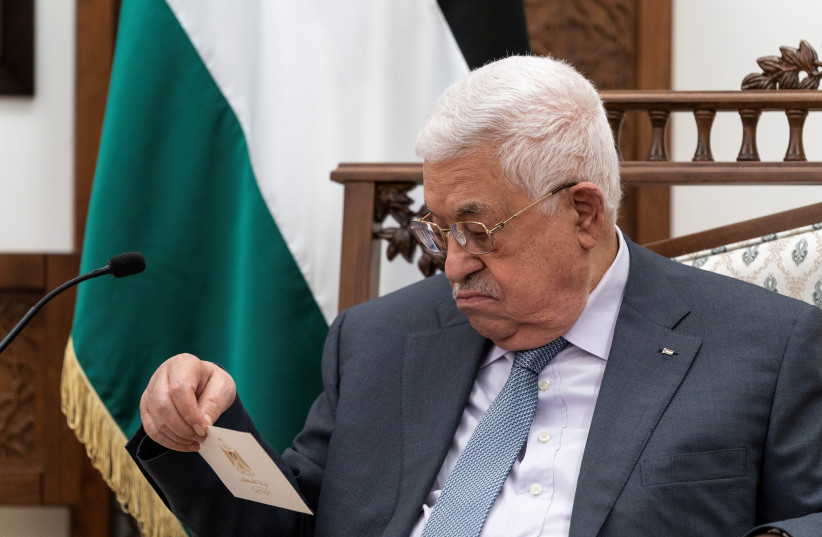Upon leaving office earlier this month, Nadav Argaman, director of the Shin Bet (Israel Security Agency), called upon the government of Israel to “seek ways to cooperate with the Palestinian Authority,” pointing out that “the absence of a dialogue between Israel and the PA… weakened the PA both economically and in terms of popular support.” In his words, “the current situation is of a strong Hamas and a weak PA.” Argaman added that “the relative quiet we witness… is elusive... It reflects the quality of thwarting [terror acts], not absence of attempts.” Indeed, during his tenure alone, Israel experienced over 500 major terror acts, and prevented over 2,000.
With both the Shin Bet and IDF having repeatedly praised the professionalism of the Palestinian security forces (PSF) and credited them with saving countless Israeli lives, Argaman’s message to the Israeli government was clear: the viability of the PA and coordination with its PSF are vital Israeli security interests.
The same message was conveyed to a delegation of the Israel Policy Forum visiting Ramallah, by a senior Palestinian security official, who shared a concern that kept him up at night. “Few Israelis realize that the motivation of our recruits is an Israeli security interest,” he said, intimating that during several recent crises, the PSF experienced a drop of 20-30% in attendance. He pointed out that his “real nightmare [was] that they not only fail to show up to work, but might show up with their weapons somewhere else.”
His reasoning had everything to do with the absence of a “political horizon.” Recalling how during the heyday of the Oslo process, PSF officers had been the pride and joy of the Palestinian public, symbolizing their state-in-being, with hope for statehood evaporating, they no longer do. Viewed now as serving the Israeli occupation rather than Palestinian aspirations, and faced with accusations of betraying the cause, some refuse to walk the street in uniform and, at moments of security tension, fail to stand for duty all together. Shame trumps training-discipline and even the acute need for a salary.
What is true of the PSF is no less relevant to the viability of the PA. As Argaman pointed out, over recent years, popular support for the PA has collapsed. Most Palestinians who were willing to overlook corruption and incompetence as long as the PA was the vehicle driving them on the road to independence, now see no value in a PA that seems to only serve its leaders and manage the occupation as an Israeli subcontractor. Few take seriously President Abbas’s repeated threat to dismantle the PA and “hand over the keys to Israel.” However, should current trends continue, many – Shin Bet included – do not rule out the possibility that the fact that Abu Mazen retains the keys might mean little once popular opposition renders the PA irrelevant.


A possible ensuing collapse of civil services, and termination of security coordination, would present Israel with the choice between standing by while Hamas exploits the governance vacuum and takes over; or preempting such an eventuality by deploying Israeli forces into all West Bank population centers. With that, rather than train for its primary mission of defending Israel, the IDF will be responsible for managing the lives of millions of Palestinians with no exit strategy in sight.
IN SHARP departure from the Netanyahu policy, the current Bennett coalition seems alert to this risk and determined to prevent it. United around two governing buzz phrases – “shrinking the conflict” and “strengthening the PA,” it prides itself in having taken steps designed to improve the Palestinian economy and avert a PA financial crisis. However constructive those measures are, and even factoring additional ones under consideration, one thing is certain: The conflict will not “shrink” and the PA will not be “strengthened,” nor will long-term stability be secured by economic measures alone. As noted above, a major missing link is that all important political horizon.
Regrettably, this challenge to PA (and overall) stability – hence to Israel’s security – is beyond the capacity of the current Israeli coalition. As Foreign Minister Yair Lapid told his Bahraini counterpart last month: “I support the two-state solution, but there is no consensus in our current government over the issue.” Indeed, this diverse coalition was enabled by ruling out the ultimate aspiration of its two opposing ideological blocks: no annexation for the one; no breakthrough to peace for the other.
Though the in-between offers important space for making good on shrinking the conflict and strengthening the PA, as well as for preserving – and improving – conditions for an eventual two-state agreement (something Lapid has hinted might be possible once he takes over as prime minister, as specified in the coalition agreement), nonetheless, for now, this coalition is incapable of providing Palestinians with what many of its members believe is essential: the promise of statehood.
Given that unfortunate reality, the question arises: Shouldn’t all third parties who are committed to an eventual two-state solution, and to secure for Palestinians (in the words of US Secretary of State Blinken) “equal measures of freedom, security, opportunity, and dignity” not be challenged with demonstrating to Palestinians that these commitments are beyond lip service?
Doing so calls for creating a moment (or a process) where Abraham Accord signatories join hands with the peace pioneers – Egypt and Jordan, as well as all other relevant third parties, in giving life and concrete meaning to the promise of an eventual two-state solution, however arduous and long the road there will be. In so doing, they should spell out expectations that the parties avoid steps that undermine the common objective as well as the risks associated with ignoring the view of this potent coalition.
As has been the case all along, and as was reiterated in a recent study by the Israel Policy Forum, none of this is likely to happen absent US leadership. One can only hope that the overwhelming international consensus around the two-state solution; the Israeli security (and other) interest in the viability of the PA; and the realization that both these objectives are at risk absent a credible commitment to the political horizon, might prompt Washington to make this happen.
The writer was senior adviser to prime minister Shimon Peres and a special ambassador of the State of Israel. He is a member of the board of Commanders for Israel’s Security (CIS) and the Israel Fellow at the Israel Policy Forum.
